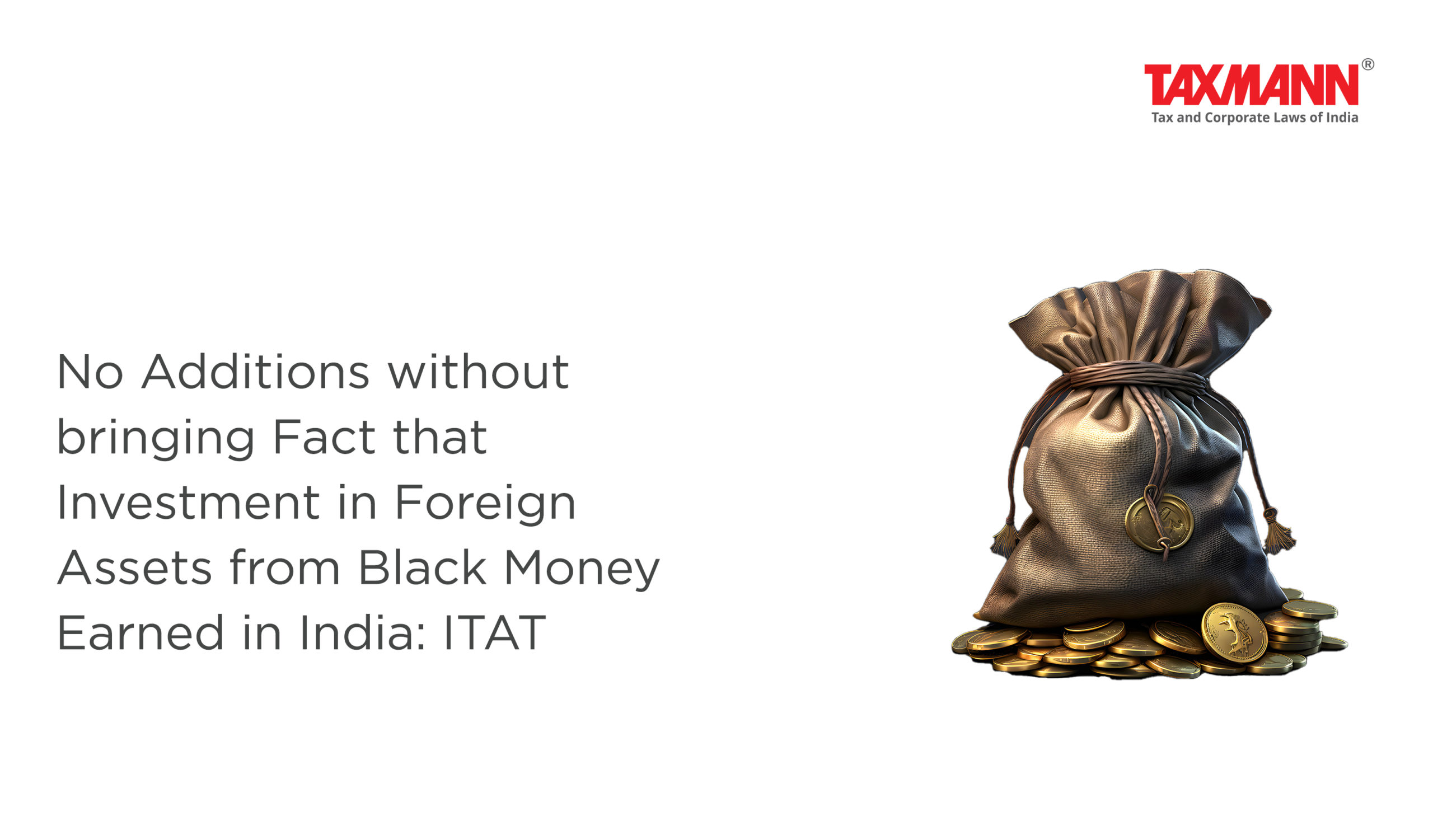No Additions without bringing Fact that Investment in Foreign Assets from Black Money Earned in India: ITAT
- Blog|News|Income Tax|
- 2 Min Read
- By Taxmann
- |
- Last Updated on 2 June, 2023

Case Details: Sri Srinjoy Bose v. ADIT (Inv.) - [2023] 150 taxmann.com 273 (Kolkata-Trib.)
Judiciary and Counsel Details
-
- Dr Manish Borad, Accountant Member & Sonjoy Sarma, Judicial Member
- Soumitra Choudhury, Adv. for the Appellant.
- P.P. Barman, Addl. CIT for the Respondent.
Facts of the Case
Assessee, an individual, purchased two insurance policies during his stay in UAE while a non-resident Indian. The assessee paid the first two premiums of the insurance policies while he was a non-resident Indian. Later, he returned to India to carry on his business activities, and his father, who was also a non-resident, paid the premium of policies.
After payment for certain years, the policy was discontinued. After approximately ten years, the assessee claimed the policy’s surrender value. The assessee did not receive any income on the investments made but only received the reduced value of the investment made in the insurance policies. Assessee disclosed such receipt in his income return in the year of receipt.
During the assessment proceedings, the Assessing Officer (AO) concluded that the assessee failed to disclose these assets in the income tax return and didn’t give any details during the one-time compliance window provided under the Black Money (Undisclosed Foreign Income and Assets) and Imposition of Tax, 2015.
Accordingly, AO assessed the undisclosed foreign income and assets under the Black Money and Imposition of Tax Act, 2015.
On appeal, CIT(A) confirmed the AO’s action, and the matter reached the Kolkata Tribunal.
ITAT Held
The Tribunal held that it is also evident from questionnaires issued by CBDT vide Circular No. 13 of 2015 dated 6-7-2015 that the foreign asset is liable to be taxed (whether reported in return or not) if the source of investment in such asset is unexplained.
In the instant case, the assessee successfully explained the source of investment, which is undoubtedly from the income earned outside India, part of which was paid by the assessee in the capacity of a non-resident Indian and the remaining part is paid by the assessee’s father, who was also a non-resident Indian from his sources of income/asset located outside India.
There is no iota of evidence by the AO which could indicate that any element of the alleged investment in foreign assets was from so-called black money earned in India. Complete details of the bank account, along with the date of payment of the insurance policy premium, support this fact that the assessee had successfully explained the source of investment in the alleged foreign asset in the form of investment in insurance policy.
Regarding the disclosure of assets, the assessee was of bona fide belief that the policies have been discontinued and the amount invested has been forfeited. Only during 2018-19 that the assessee comes across the information of being eligible to lodge the claim for a refund of surrender value.
Further, the value of the alleged investments received by the assessee in India has already been subjected to Income-tax and taxing the same amount under the Black Money Act 2015 will be tantamount to double taxation. Thus, AO was not justified in invoking the provisions of Black Money.
Disclaimer: The content/information published on the website is only for general information of the user and shall not be construed as legal advice. While the Taxmann has exercised reasonable efforts to ensure the veracity of information/content published, Taxmann shall be under no liability in any manner whatsoever for incorrect information, if any.

Taxmann Publications has a dedicated in-house Research & Editorial Team. This team consists of a team of Chartered Accountants, Company Secretaries, and Lawyers. This team works under the guidance and supervision of editor-in-chief Mr Rakesh Bhargava.
The Research and Editorial Team is responsible for developing reliable and accurate content for the readers. The team follows the six-sigma approach to achieve the benchmark of zero error in its publications and research platforms. The team ensures that the following publication guidelines are thoroughly followed while developing the content:
- The statutory material is obtained only from the authorized and reliable sources
- All the latest developments in the judicial and legislative fields are covered
- Prepare the analytical write-ups on current, controversial, and important issues to help the readers to understand the concept and its implications
- Every content published by Taxmann is complete, accurate and lucid
- All evidence-based statements are supported with proper reference to Section, Circular No., Notification No. or citations
- The golden rules of grammar, style and consistency are thoroughly followed
- Font and size that’s easy to read and remain consistent across all imprint and digital publications are applied



 CA | CS | CMA
CA | CS | CMA
